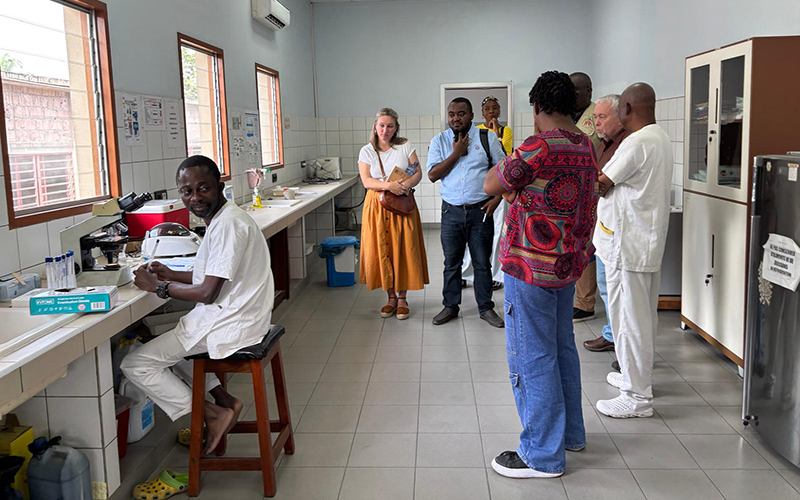
The project delegation during their visit to the Kingasani maternity laboratory
The mission involved several of the project’s stakeholders, including experts and representatives from the AFD, the Mérieux Foundation, the French national reference laboratory for malaria (AP-HP Sorbonne University), an international bacteriology expert, the National Institute of Biomedical Research (INRB), and beneficiary institutions.
Following meetings between the teams, attendees had an opportunity visit several sites involved in the project, including the INRB Kinshasa laboratories, the University Clinics of Kinshasa (CUK), the N’Galiema clinic, the Binza and Kingasani maternity units, and technical and financial partners such as the PNLP and Expertise France.
These visits and work sessions were a chance to address the project’s key themes, with a focus on the parasitology and bacteriology activities. The field visits enabled delegates to talk to the beneficiary institutions’ directors and the technical teams in the laboratories, and to observe each laboratory’s technical facilities. The lessons learned will be used to guide the support offered by the project (i.e. equipment, consumables, and training). The mission was also an opportunity to hold the first Technical Committee meeting to monitor the project’s progress, with support from international experts.
This was the third mission organized this year as part of the project. The first took place in January, involving a team from the Mérieux Foundation’s Kinshasa office, and included the project’s first annual steering committee meeting. The second saw the INRB and Mérieux Foundation parasitology team traveling to Paris in March to begin collaboration with France’s national reference laboratory for malaria and the company MYC, which have developed an AI-based app called MalarIA. The app will be tested in the DRC with the help of the INRB and its network of laboratories.
About the project
This support project for the National Institute of Biomedical Research in Kinshasa emerged from bilateral collaboration between the Democratic Republic of the Congo and France. The French Development Agency selected the Mérieux Foundation to manage the initiative. The project was officially launched in January 2025.
The main purpose of the initiative is to strengthen the INRB’s organizational and technical capabilities in its role as a national public health laboratory and to reduce gender inequality.
This primary goal incorporates three specific objectives:
- Optimizing the INRB’s organization in terms of the capacity of its technical and administrative departments, its institutional governance, and its quality management.
- Strengthening the INRB’s capabilities in its role as a national reference laboratory and its work to reduce gender inequality, and revitalizing its technical support for hospitals in the field of antimicrobial resistance and malaria.
- Strengthening practical hospital-based training in microbiology for future medical biologists, incorporating gender issues.
